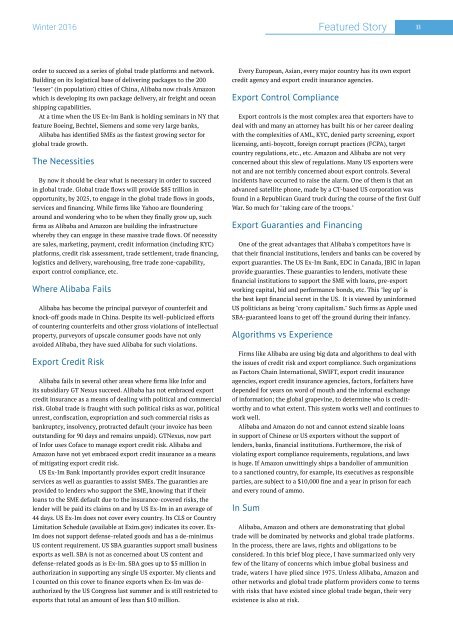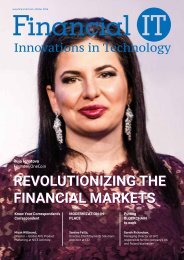Revolutionizing the Financial Markets
You also want an ePaper? Increase the reach of your titles
YUMPU automatically turns print PDFs into web optimized ePapers that Google loves.
Winter 2016 Featured Story 33<br />
order to succeed as a series of global trade platforms and network.<br />
Building on its logistical base of delivering packages to <strong>the</strong> 200<br />
"lesser" (in population) cities of China, Alibaba now rivals Amazon<br />
which is developing its own package delivery, air freight and ocean<br />
shipping capabilities.<br />
At a time when <strong>the</strong> US Ex-Im Bank is holding seminars in NY that<br />
feature Boeing, Bechtel, Siemens and some very large banks,<br />
Alibaba has identified SMEs as <strong>the</strong> fastest growing sector for<br />
global trade growth.<br />
The Necessities<br />
By now it should be clear what is necessary in order to succeed<br />
in global trade. Global trade flows will provide $85 trillion in<br />
opportunity, by 2025, to engage in <strong>the</strong> global trade flows in goods,<br />
services and financing. While firms like Yahoo are floundering<br />
around and wondering who to be when <strong>the</strong>y finally grow up, such<br />
firms as Alibaba and Amazon are building <strong>the</strong> infrastructure<br />
whereby <strong>the</strong>y can engage in <strong>the</strong>se massive trade flows. Of necessity<br />
are sales, marketing, payment, credit information (including KYC)<br />
platforms, credit risk assessment, trade settlement, trade financing,<br />
logistics and delivery, warehousing, free trade zone-capability,<br />
export control compliance, etc.<br />
Where Alibaba Fails<br />
Alibaba has become <strong>the</strong> principal purveyor of counterfeit and<br />
knock-off goods made in China. Despite its well-publicized efforts<br />
of countering counterfeits and o<strong>the</strong>r gross violations of intellectual<br />
property, purveyors of upscale consumer goods have not only<br />
avoided Alibaba, <strong>the</strong>y have sued Alibaba for such violations.<br />
Export Credit Risk<br />
Alibaba fails in several o<strong>the</strong>r areas where firms like Infor and<br />
its subsidiary GT Nexus succeed. Alibaba has not embraced export<br />
credit insurance as a means of dealing with political and commercial<br />
risk. Global trade is fraught with such political risks as war, political<br />
unrest, confiscation, expropriation and such commercial risks as<br />
bankruptcy, insolvency, protracted default (your invoice has been<br />
outstanding for 90 days and remains unpaid). GTNexus, now part<br />
of Infor uses Coface to manage export credit risk. Alibaba and<br />
Amazon have not yet embraced export credit insurance as a means<br />
of mitigating export credit risk.<br />
US Ex-Im Bank importantly provides export credit insurance<br />
services as well as guaranties to assist SMEs. The guaranties are<br />
provided to lenders who support <strong>the</strong> SME, knowing that if <strong>the</strong>ir<br />
loans to <strong>the</strong> SME default due to <strong>the</strong> insurance-covered risks, <strong>the</strong><br />
lender will be paid its claims on and by US Ex-Im in an average of<br />
44 days. US Ex-Im does not cover every country. Its CLS or Country<br />
Limitation Schedule (available at Exim.gov) indicates its cover. Ex-<br />
Im does not support defense-related goods and has a de-minimus<br />
US content requirement. US SBA guaranties support small business<br />
exports as well. SBA is not as concerned about US content and<br />
defense-related goods as is Ex-Im. SBA goes up to $5 million in<br />
authorization in supporting any single US exporter. My clients and<br />
I counted on this cover to finance exports when Ex-Im was deauthorized<br />
by <strong>the</strong> US Congress last summer and is still restricted to<br />
exports that total an amount of less than $10 million.<br />
Every European, Asian, every major country has its own export<br />
credit agency and export credit insurance agencies.<br />
Export Control Compliance<br />
Export controls is <strong>the</strong> most complex area that exporters have to<br />
deal with and many an attorney has built his or her career dealing<br />
with <strong>the</strong> complexities of AML, KYC, denied party screening, export<br />
licensing, anti-boycott, foreign corrupt practices (FCPA), target<br />
country regulations, etc., etc. Amazon and Alibaba are not very<br />
concerned about this slew of regulations. Many US exporters were<br />
not and are not terribly concerned about export controls. Several<br />
incidents have occurred to raise <strong>the</strong> alarm. One of <strong>the</strong>m is that an<br />
advanced satellite phone, made by a CT-based US corporation was<br />
found in a Republican Guard truck during <strong>the</strong> course of <strong>the</strong> first Gulf<br />
War. So much for "taking care of <strong>the</strong> troops."<br />
Export Guaranties and Financing<br />
One of <strong>the</strong> great advantages that Alibaba's competitors have is<br />
that <strong>the</strong>ir financial institutions, lenders and banks can be covered by<br />
export guaranties. The US Ex-Im Bank, EDC in Canada, JBIC in Japan<br />
provide guaranties. These guaranties to lenders, motivate <strong>the</strong>se<br />
financial institutions to support <strong>the</strong> SME with loans, pre-export<br />
working capital, bid and performance bonds, etc. This "leg up" is<br />
<strong>the</strong> best kept financial secret in <strong>the</strong> US. It is viewed by uninformed<br />
US politicians as being "crony capitalism." Such firms as Apple used<br />
SBA-guaranteed loans to get off <strong>the</strong> ground during <strong>the</strong>ir infancy.<br />
Algorithms vs Experience<br />
Firms like Alibaba are using big data and algorithms to deal with<br />
<strong>the</strong> issues of credit risk and export compliance. Such organizations<br />
as Factors Chain International, SWIFT, export credit insurance<br />
agencies, export credit insurance agencies, factors, forfaiters have<br />
depended for years on word of mouth and <strong>the</strong> informal exchange<br />
of information; <strong>the</strong> global grapevine, to determine who is creditworthy<br />
and to what extent. This system works well and continues to<br />
work well.<br />
Alibaba and Amazon do not and cannot extend sizable loans<br />
in support of Chinese or US exporters without <strong>the</strong> support of<br />
lenders, banks, financial institutions. Fur<strong>the</strong>rmore, <strong>the</strong> risk of<br />
violating export compliance requirements, regulations, and laws<br />
is huge. If Amazon unwittingly ships a bandolier of ammunition<br />
to a sanctioned country, for example, its executives as responsible<br />
parties, are subject to a $10,000 fine and a year in prison for each<br />
and every round of ammo.<br />
In Sum<br />
Alibaba, Amazon and o<strong>the</strong>rs are demonstrating that global<br />
trade will be dominated by networks and global trade platforms.<br />
In <strong>the</strong> process, <strong>the</strong>re are laws, rights and obligations to be<br />
considered. In this brief blog piece, I have summarized only very<br />
few of <strong>the</strong> litany of concerns which imbue global business and<br />
trade, waters I have plied since 1975. Unless Alibaba, Amazon and<br />
o<strong>the</strong>r networks and global trade platform providers come to terms<br />
with risks that have existed since global trade began, <strong>the</strong>ir very<br />
existence is also at risk.







